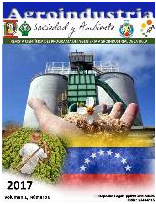TRATAMIENTO BIOLÓGICO DE AGUAS RESIDUALES GENERADAS EN UNA EMBOTELLADORA DE BEBIDAS NO ALCOHÓLICAS
Abstract
Industrial wastewater presents a large amount of contaminants that have a negative and complex action on the environment when they are discharged without adequate treatment, affecting the natural development of the ecosystems, which has led to the implementation of various methods for removal of the contaminants present. In this sense, a study was carried out to determine the treatment required for wastewater generated in a soft drink industry. The physicochemical and microbiological characterization of the effluent was carried out using the methods described in the Standard Method and the COVENIN Standards, respectively. Sequential batch reactors (SBR) were installed and operated under two different conditions (aerobic and anaerobic) with the objective of evaluating the COD removal. The characterization of the effluent of non-alcoholic beverages showed that the main pollutants released in the wastewater are organic matter, measured as COD and total and fecal coliform bacteria. The aerobic treatment in the SBR proved to be more efficient for the removal of organic matter and fecal coliforms from the industrial effluent. Finally, the minimum units required for the treatment of industrial wastewater would be the biological reactor followed by the disinfection tank
Downloads
Published
How to Cite
Issue
Section
Copyright (c) 2021 Abner Linares , María Gabriela Pire-Sierra, Eudimar Lameda-Cuicas , Luisa Molina-Quintero , María Carolina Pire-Sierra

This work is licensed under a Creative Commons Attribution-NonCommercial-ShareAlike 4.0 International License.




